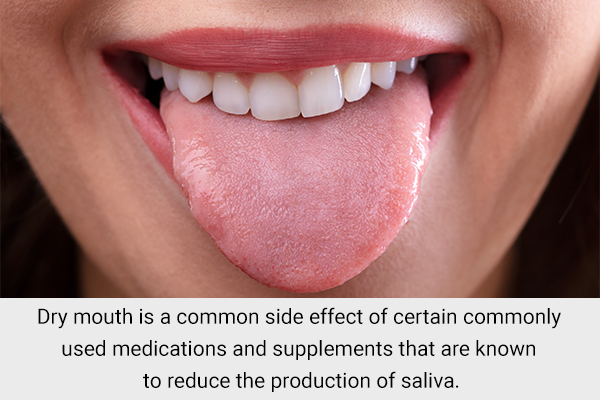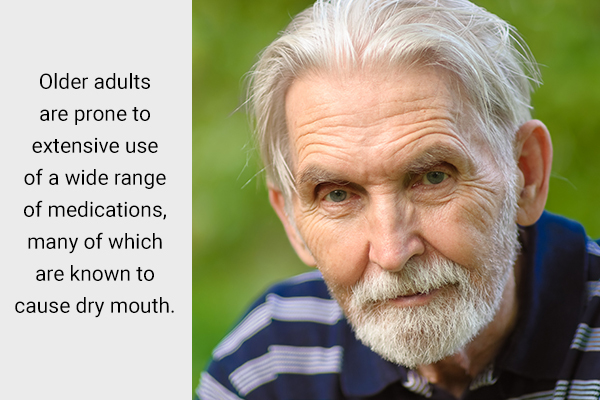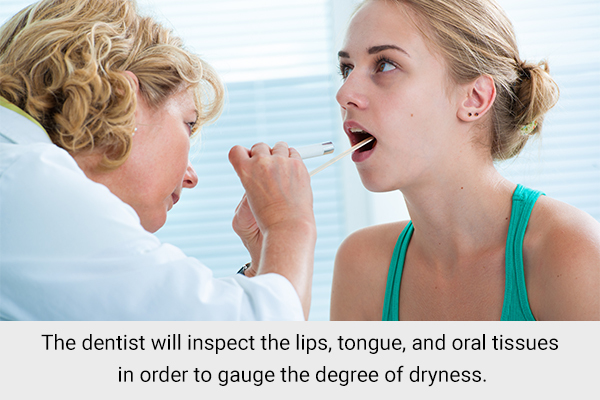In this article:
Anything from insufficient water intake, nerves, and stress to excessive physical activity can make your mouth feel utterly parched. Such occasional dryness is hardly a cause of concern and can easily be corrected by an increased dose of water.

If, however, your mouth continues to feel dry as a desert regardless of your water intake, your salivary glands may not be functioning as well as they should.
Chronic dry mouth, medically known as xerostomia, is essentially a consequence of reduced salivary flow or a change in the composition of saliva. (1)
The Importance of Saliva
Oral health: Saliva washes over the soft and hard tissues in the mouth to form a protective film against ulcers, sores, and other frictional movements that accompany normal eating and speaking. It is also the first line of defense against bacterial, fungal, and viral threats that can lead to oral disease.
It works by neutralizing the acids produced by oral bacteria, deterring further microbial growth in the mouth, helping with teeth remineralization, and flushing away food particles and other debris to prevent plaque buildup.
For all its worth, however, the role of salivary flow in preventing gum disease and tooth decay is often undermined.
Digestion: Saliva helps with the breakdown of food in the mouth and has a fluid consistency that makes it easier for you to chew your food and swallow it. It even contains certain enzymes that help you stomach the food better. Thus, saliva assists with the digestion process every step of the way.
Another prized attribute of saliva is that it acts as a solvent for the taste stimuli, thereby enhancing a person’s ability to taste the food they consume.
Causes of Dry Mouth

The following factors can be causative of dry mouth.
1. Medications
Dry mouth is a common side effect of certain commonly used medications and supplements that are known to reduce the production of saliva.
There’s a long list of both prescription and over-the-counter (OTC) drugs that can trigger this condition, including several antidepressants, diuretics, decongestants, NSAIDs, amphetamines such as Adderall, muscle relaxants, antidiarrheals, and meds for the treatment of high blood pressure, nerve pain (neuropathy), Parkinson’s disease, and anxiety, among others.
All in all, there are over 400 such drugs that tend to make your mouth dry for as long as they are being used, but the condition usually resolves once the medication is discontinued. Taking multiple medications on a daily basis, also known as polypharmacy, can also lead to dry mouth.
2. Other medical conditions
There are a number of health ailments that can affect the functioning of your salivary glands and trigger xerostomia as a side effect. These include diabetes, anxiety, anemia, oral thrush sarcoidosis, hypertension, mumps, cystic fibrosis, and autoimmune diseases such as Sjogren’s syndrome, rheumatoid arthritis, and HIV/AIDS.
Neurological conditions such as Alzheimer’s disease and Parkinson’s disease can leave the patient dehydrated, which can lead to dry mouth. Moreover, these conditions, as well as stroke, have all been associated with a false sense of a dry mouth despite properly functioning salivary glands.
3. Neuropathy
The nerves in your head and neck can become damaged either due to some form of traumatic injury or surgery, thereby diminishing your ability to perceive oral sensations. As a result, you may feel dryness in the mouth even though the salivary function is adequate.
4. Dehydration
Not drinking enough water on a regular basis and other factors that might contribute to dehydration such as excessive sweating, bouts of fever, vomiting, and diarrhea, as well as loss of blood and burns, can cause dry mouth.
5. Cancer treatment
People undergoing cancer treatment in the form of chemotherapy or radiation therapy are also at an increased risk of dry mouth. The drugs used in chemotherapy can alter the nature and volume of the saliva produced for as long as the treatment continues.
Radiation to the head or neck can end up damaging the salivary glands, resulting in a significant decrease in saliva production.
6. Aging

People tend to become more susceptible to dry mouth with advancing age on account of several contributing factors. In general, older adults are prone to extensive use of a wide range of medications, many of which are known to cause dry mouth.
Also, their body’s ability to process these drugs dwindles with age. Inadequate nutrition as well as preexisting health issues can also aggravate this condition.
7. Mental health
If you are prone to stress, anxiety, and depression, chances are you may develop dry mouth as a side effect.
8. Lifestyle factors
Unhealthy habits such as cigarette smoking, chewing tobacco, or drinking alcohol can impair salivary flow and contribute to dry mouth. Snoring with your mouth open can also lead to dry mouth.
The use of recreational drugs such as methamphetamine and marijuana too can dry out your mouth as well as damage your teeth. Excess amount of caffeine due to frequent intake of tea and coffee a day causes dehydration, resulting in a dry mouth.
9. Pregnancy
Pregnant or breastfeeding mothers often experience dehydration and certain hormonal changes that make them increasingly prone to dry mouth.
10. Eating disorders
Bulimia and anorexia can increase your risk of developing xerostomia.
Signs and Symptoms of Dry Mouth
- Dry or sticky feeling in the mouth
- Burning feeling in mouth or tongue
- The tongue may become inflamed and sometimes feel leathery
- Discomfort while chewing or swallowing dry and crumbly foods
- Difficulty speaking
- Dry and sore throat
- Fissuring or splitting of the skin at the corners of the mouth
- Thick or stringy saliva
- White tongue, which may indicate a fungal infection
- Excessive thirst
- Mouth sores
- Glossodynia, or a painful tongue
- Bad breath
- Dry nasal passages
- Hoarseness
- Altered or diminished sense of taste
- Chapped or cracked lips
- Lipstick tends to stick to the teeth more often
How Can I Treat Dry Mouth?
Dry mouth is not a disease by itself but symptomatic of some underlying issue. Thus, the treatment for this condition depends upon its root cause.
If your dry mouth is stemming from another medical condition, it will require additional treatment to address the parent problem.
Here are some common interventions used for addressing dry mouth:
- In a lot of cases, dry mouth occurs as a side effect of certain medications. If that is found to be the case, your pharmacist or doctor can help you adjust the dose you’re taking or switch you to a better alternative that doesn’t cause dry mouth. If the drug choice and dosage cannot be altered, it may serve you well to take it in the morning rather than at night as the latter is more likely to cause cavities. Whatever you do, don’t be hasty or make changes without consulting your doctor first.
- There is no replacement for regular oral hygiene and dental care, which entail brushing your teeth twice a day, flossing, and rinsing your mouth with an alcohol-free mouthwash such as Biotene. Make sure that your toothpaste and mouthwash contain fluoride for added protection against tooth decay.
- You can also use OTC products that will assist in moisturizing the oral tissues such as saliva substitutes and glycerin-containing oral lubricants in the form of gel or sprays.
- Salivary stimulants are yet another recommended treatment aid. These come in the form of sugarless gums, mints, and candies to help stimulate salivary flow. Certain prescription medications such as pilocarpine (Salagen) and cevimeline (Evoxac) perform the same function, but are not recommended for people with asthma or glaucoma.
- The moisture in your mouth can also be replaced by using artificial saliva and oral rinses that are readily available at any pharmacy.
All said and done, there are cases of dry mouth that remain incurable as the causal agent cannot always be eliminated. In such cases, it becomes necessary to use nonmedicinal methods to alleviate the symptoms associated with dry mouth and to maintain good oral and dental health. (2)
Diagnosis of Dry Mouth

In order to determine the cause of your dry mouth, your doctor or dentist will first closely review your medical history and the medications you are currently on. You will be asked to give a detailed description of your symptoms, which will be followed by a thorough physical examination.
The dentist will inspect the lips, tongue, and oral tissues in order to gauge the degree of dryness. The oral cavity will be closely examined for sores caused by the fungus Candida albicans as well as signs of cavities and gum disease.
The doctor might assess the functioning of the main salivary glands and ducts to see if there are any obstructions and also measure the stimulated and unstimulated salivary flow. (2)
By the end of the medical history and intraoral examination, your dentist is likely to pin down a particular culprit for your condition. However, in some cases, the doctor may conduct a few additional tests including blood sampling and imaging scans of your salivary glands to get a clearer picture.
Risk Factors That May Lead to Dry Mouth
- Because elderly people use medications more frequently than the younger population, dry mouth remains an impending threat for the older demographic.
- There is a greater incidence of dry mouth cases among women than men.
- People who have suffered from extensive tooth decay are more likely to experience dry mouth.
- People with dry eyes, dry skin, rash, or joint pain are highly likely to develop dry mouth. This is summarized as Sjogren’s syndrome.
Complications Associated With Dry Mouth
The following complications associated with chronic xerostomia should alert you to the importance of good daily oral care:
- An increased incidence of periodontal disease, including caries and tooth wear.
- Increased dental decay due to plaque and debris retention in the mouth.
- Dry mouth can make wearing dentures a source of great discomfort, leading to problems with denture retention, denture sores, and the tongue sticking to the palate.
When to See a Doctor
You may need to drop by your dentist if:
- You continue to experience dryness in your mouth even after appropriate self-care and medical treatment for a few weeks.
- You notice the development of sore white patches in your mouth.
- Your mouth becomes increasingly red, swollen, and painful.
- You have difficulty chewing or swallowing food.
- You find it difficult to speak.
- You suspect that a prescribed medication, which cannot be discontinued without a doctor’s advice, is triggering your condition.
- You develop symptoms such as an increased frequency to urinate or dry eyes.
Final Word
Dry mouth at its worst can jeopardize the integrity of your oral cavity, hamper your ability to speak, and adversely affect your appetite, digestion, and enjoyment of food, thereby paving the way for malnutrition as well as permanent mouth and throat disorders.
So, best to seek medical treatment at the earliest to keep this seemingly harmless issue under control before it starts hampering your oral and digestive health.

- Was this article helpful?
- YES, THANKS!NOT REALLY


